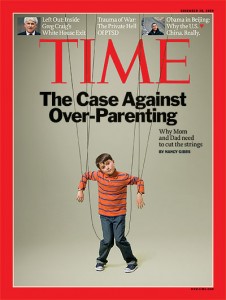  A must read in the latest Time Magazine  by Nancy Gibbs
 A must read in the latest Time Magazine  by Nancy Gibbs
Can these parents be saved?
Visit msnbc.com for Breaking News, World News, and News about the Economy
  A must read in the latest Time Magazine  by Nancy Gibbs
 A must read in the latest Time Magazine  by Nancy Gibbs
Can these parents be saved?
Visit msnbc.com for Breaking News, World News, and News about the Economy
 A new study has found that young people feel differently about two types of parental control, generally viewing a type of control that’s thought to be better for their development more positively. However, when parents are very controlling, young people no longer make this distinction and view both types of parental control negatively. The study, conducted in the United States by researchers at Örebro University in Sweden, appears in the November/December 2009 issue of the journal Child Development. Unlike a lot of prior research on parenting that’s focused on control, this study looked at how adolescents view and react to parental control. [continue reading…]
A new study has found that young people feel differently about two types of parental control, generally viewing a type of control that’s thought to be better for their development more positively. However, when parents are very controlling, young people no longer make this distinction and view both types of parental control negatively. The study, conducted in the United States by researchers at Örebro University in Sweden, appears in the November/December 2009 issue of the journal Child Development. Unlike a lot of prior research on parenting that’s focused on control, this study looked at how adolescents view and react to parental control. [continue reading…]
In one of the studies, many parents reported they told their young children that bad things would happen if they didn’t go to bed or eat what they were supposed to. For example, one mother said she told her child that if he didn’t finish all of his food he would get pimples all over his face. Other parents reported inventing magical creatures. One explained, “We told our daughter that if she wrapped up all her pacifiers like gifts, the ‘paci-fairy’ would come and give them to children who needed them. I thought it was healthier to get rid of the pacifiers and it was a way for her to feel proud and special.” [continue reading…]
Slate   Another great piece on parenting by Alan E. Kazdin and Carlo Rotella. When there’s something you really, really want your child to do…………
As President Obama has discovered in pushing health care reform, antecedents that convey even a slight pressure or urgency and even the appearance of a reduction in choice can sometimes have the effect of strengthening opposition that would not otherwise occur or be so strong. Urgency can inspire push-back and resistance to even the most rational pitch—not by everyone, but by a lot of people. The psychological term for that reaction is normal.
In the home, a parent’s regular vigilance and responsible parenting can rise to the level of desperation and in turn lead to a reaction: a little more digging in of the heels on the part of the child. Are we merely blaming the parent here? No. What the parent is doing and the child’s reaction are both well within the normal range, even though each may see the other as perversely manipulative or unreasonably controlling. Rather, the antecedent conditions (urgency, eagerness, explicit or implicit pressure) in which the request for behavior is sandwiched now make it more unlikely to occur. continue reading